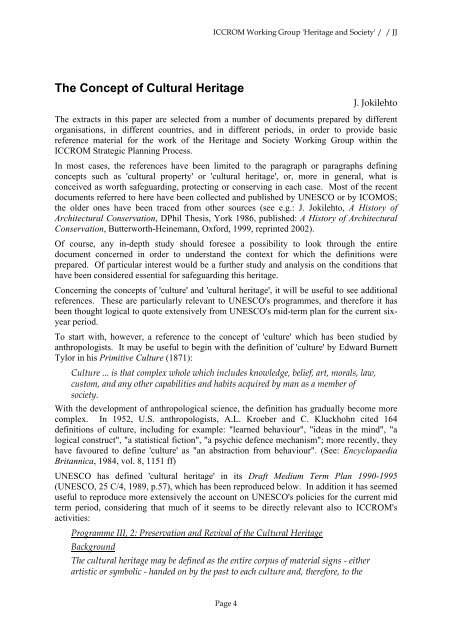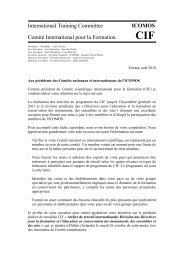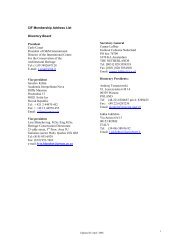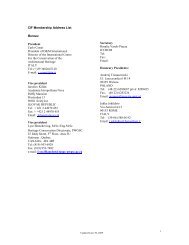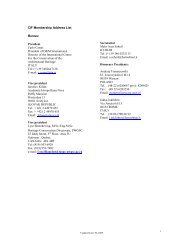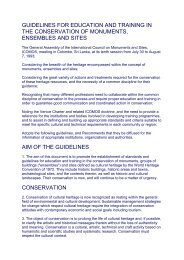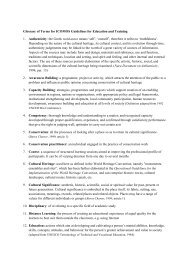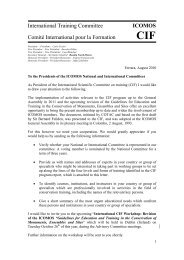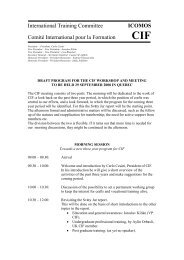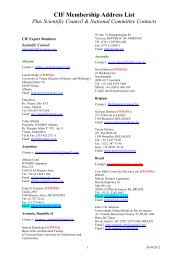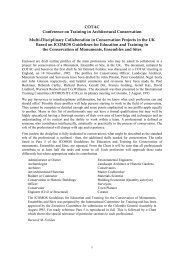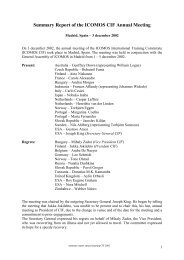Definition of Cultural Heritage -- References to ... - CIF - Icomos
Definition of Cultural Heritage -- References to ... - CIF - Icomos
Definition of Cultural Heritage -- References to ... - CIF - Icomos
Create successful ePaper yourself
Turn your PDF publications into a flip-book with our unique Google optimized e-Paper software.
The Concept <strong>of</strong> <strong>Cultural</strong> <strong>Heritage</strong><br />
ICCROM Working Group '<strong>Heritage</strong> and Society' / / JJ<br />
J. Jokileh<strong>to</strong><br />
The extracts in this paper are selected from a number <strong>of</strong> documents prepared by different<br />
organisations, in different countries, and in different periods, in order <strong>to</strong> provide basic<br />
reference material for the work <strong>of</strong> the <strong>Heritage</strong> and Society Working Group within the<br />
ICCROM Strategic Planning Process.<br />
In most cases, the references have been limited <strong>to</strong> the paragraph or paragraphs defining<br />
concepts such as 'cultural property' or 'cultural heritage', or, more in general, what is<br />
conceived as worth safeguarding, protecting or conserving in each case. Most <strong>of</strong> the recent<br />
documents referred <strong>to</strong> here have been collected and published by UNESCO or by ICOMOS;<br />
the older ones have been traced from other sources (see e.g.: J. Jokileh<strong>to</strong>, A His<strong>to</strong>ry <strong>of</strong><br />
Architectural Conservation, DPhil Thesis, York 1986, published: A His<strong>to</strong>ry <strong>of</strong> Architectural<br />
Conservation, Butterworth-Heinemann, Oxford, 1999, reprinted 2002).<br />
Of course, any in-depth study should foresee a possibility <strong>to</strong> look through the entire<br />
document concerned in order <strong>to</strong> understand the context for which the definitions were<br />
prepared. Of particular interest would be a further study and analysis on the conditions that<br />
have been considered essential for safeguarding this heritage.<br />
Concerning the concepts <strong>of</strong> 'culture' and 'cultural heritage', it will be useful <strong>to</strong> see additional<br />
references. These are particularly relevant <strong>to</strong> UNESCO's programmes, and therefore it has<br />
been thought logical <strong>to</strong> quote extensively from UNESCO's mid-term plan for the current sixyear<br />
period.<br />
To start with, however, a reference <strong>to</strong> the concept <strong>of</strong> 'culture' which has been studied by<br />
anthropologists. It may be useful <strong>to</strong> begin with the definition <strong>of</strong> 'culture' by Edward Burnett<br />
Tylor in his Primitive Culture (1871):<br />
Culture ... is that complex whole which includes knowledge, belief, art, morals, law,<br />
cus<strong>to</strong>m, and any other capabilities and habits acquired by man as a member <strong>of</strong><br />
society.<br />
With the development <strong>of</strong> anthropological science, the definition has gradually become more<br />
complex. In 1952, U.S. anthropologists, A.L. Kroeber and C. Kluckhohn cited 164<br />
definitions <strong>of</strong> culture, including for example: "learned behaviour", "ideas in the mind", "a<br />
logical construct", "a statistical fiction", "a psychic defence mechanism"; more recently, they<br />
have favoured <strong>to</strong> define 'culture' as "an abstraction from behaviour". (See: Encyclopaedia<br />
Britannica, 1984, vol. 8, 1151 ff)<br />
UNESCO has defined 'cultural heritage' in its Draft Medium Term Plan 1990-1995<br />
(UNESCO, 25 C/4, 1989, p.57), which has been reproduced below. In addition it has seemed<br />
useful <strong>to</strong> reproduce more extensively the account on UNESCO's policies for the current mid<br />
term period, considering that much <strong>of</strong> it seems <strong>to</strong> be directly relevant also <strong>to</strong> ICCROM's<br />
activities:<br />
Programme III, 2: Preservation and Revival <strong>of</strong> the <strong>Cultural</strong> <strong>Heritage</strong><br />
Background<br />
The cultural heritage may be defined as the entire corpus <strong>of</strong> material signs - either<br />
artistic or symbolic - handed on by the past <strong>to</strong> each culture and, therefore, <strong>to</strong> the<br />
Page 4


